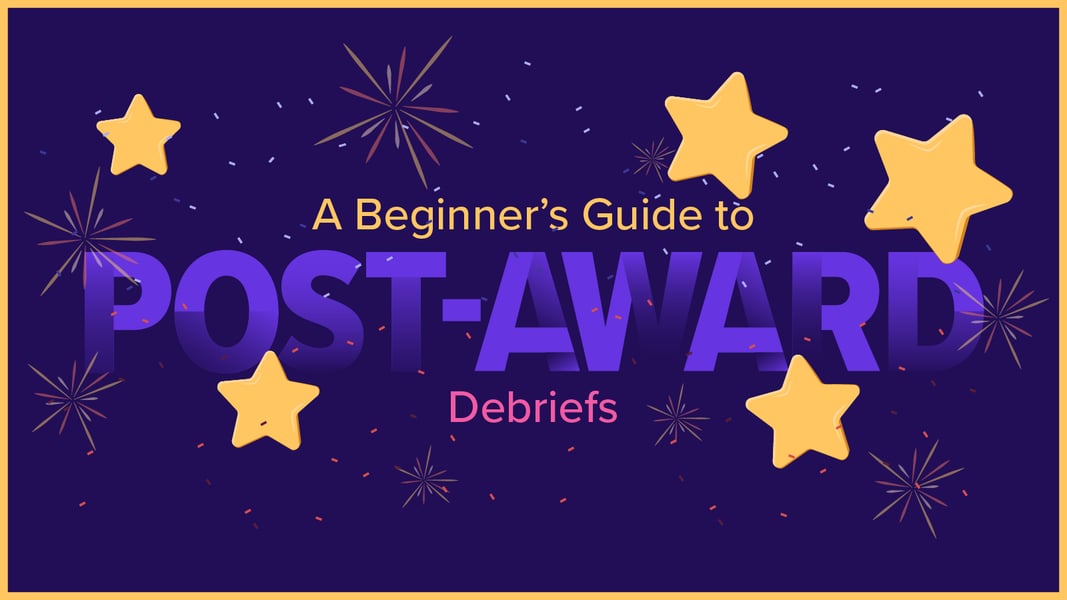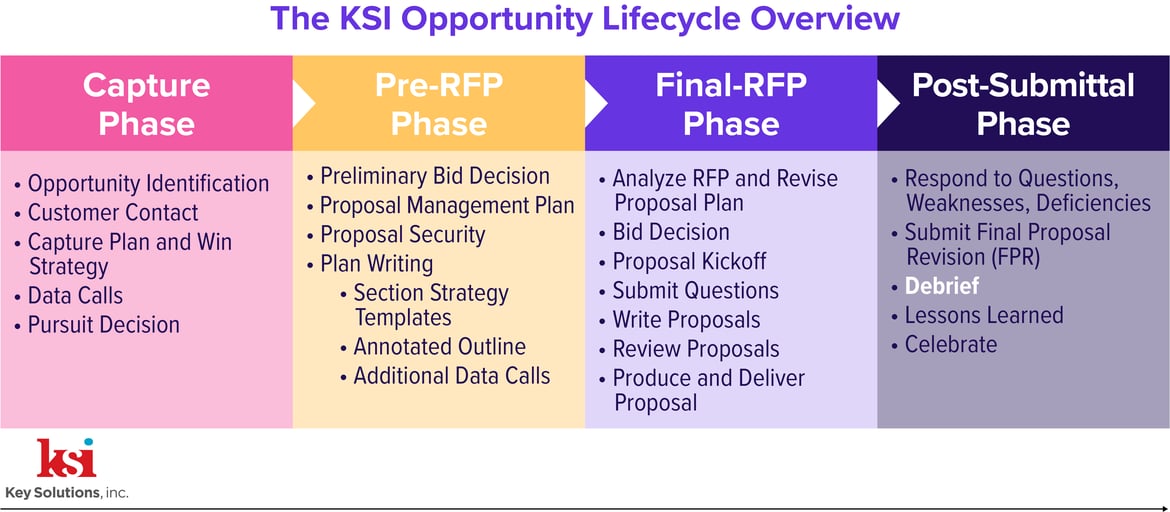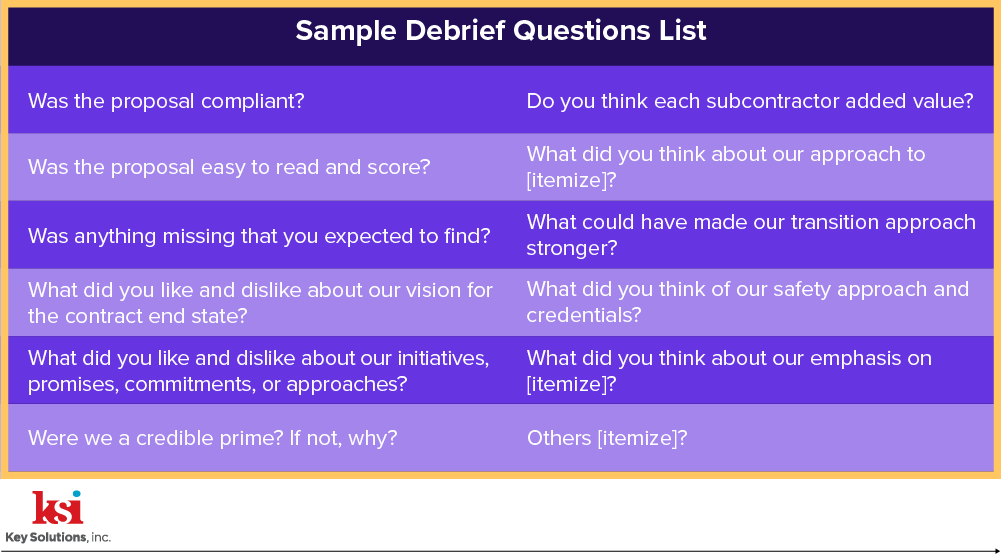
Post Award Debriefs: What are they and what is their purpose?
In this article, we'll discuss the difference between Pre- and Post-Award Debriefs, how to maximize their usefulness, and how to use debriefings to improve your proposal processes and win rates.
Under FAR Part 15, a debriefing is an opportunity for an offeror to better understand the basis for an agency’s selection decision. Debriefings give you a chance to hear from the government regarding:
- What the evaluation process entailed?
- How your proposal scored based on the evaluation
criteria? - What was successful about your proposal?
- What was lacking and in need of improvement in your
proposal?
Debriefings can be done orally, in writing, or by any other method acceptable to the Contracting Officer. Debriefings are directed to the successful offeror and also the unsuccessful offerors, so always remember to ask for a debrief, win or lose.
You can use and apply the information they provide for future proposals. Debriefings on the results of the selection process can take place:
- Pre-award
- After a company has been eliminated from the competitive range
- After an award has been made
What is the Difference Between a Pre-Award Debrief and a Post-Award Debrief?
Pre-Award Debriefs:
The Pre-Award Debriefs are for offerors eliminated from competition before an award is made. This debrief includes:
- The agency’s evaluation of significant elements in the offeror’s proposal
- A summary of the rationale for eliminating the offeror from the competition
- Reasonable responses to relevant questions about whether source selection procedures contained in the solicitation, applicable regulations, and other applicable authorities were followed in the process of eliminating the offeror from the competition
Post-Award Debriefs:
Post-Award Debriefs are the process by which any offeror, whether successful or unsuccessful, is presented the right to understand the reason why its proposal or bid was either accepted or rejected, but without a comparison with other offerors' proposals. As you can see below in the Opportunity Lifecycle, the Post-Award Debrief takes place in the Post-Submittal Phase.

Within three days after the date of contract award, the Contracting Officer provides written notification to each offeror whose proposal was in the competitive range but was not selected for award. This notice includes the following information:
- The number of offerors solicited
- The number of proposals received
- The name and address of each offeror receiving an award
- The items, quantities, and any stated unit prices of each award
- In general terms, the reason(s) the offeror’s proposal was not accepted
An offeror that provides a written request to the agency within three days of the contract award is entitled to be debriefed and given the basis for the selection decision and contract award. To the maximum extent possible, the debriefing should occur within five days after receipt of the written request.
At a minimum, the debriefing information includes:
- The government’s evaluation of the significant weaknesses or deficiencies in the offeror’s proposal, if applicable
- The overall evaluated cost or price (including unit prices), and technical rating, if applicable, of the successful offeror and the debriefed offeror, and past performance information on the debriefed offeror
- The overall ranking of all offerors, if any ranking was developed by the agency during the source selection
- A summary of the rationale for the award
- Reasonable responses to relevant questions about whether source selection procedures contained in the solicitation, applicable regulations, and other applicable authorities were followed

A debriefing does not include point-by-point comparisons of the debriefed offeror’s proposal with those of other offerors. The debriefing will not reveal any information prohibited from disclosure by the Federal Acquisition Regulation (FAR) or exempt from release under the Freedom of Information Act (FOIA) including:
- Trade secrets
- Privileged or confidential manufacturing processes and techniques
- Commercial and financial information that is privileged or confidential, including cost breakdowns, profit, indirect cost rates, and similar information
- The names of individuals providing reference information about an offeror’s past performance
How to Make a Debrief Useful and Productive
To make the debrief as useful and productive as possible, develop a set of questions to ask during the debrief. The following table lists the types of questions that you may want to ask. In addition, always ask how you could have done better, and ask about all evaluation criteria, including subfactors.

How to Use Debriefings to Improve Your Win Rates
A debrief after a win is a good opportunity to learn where you fell short in the proposal because customers can afford to be candid. And in being candid, they will often discuss their insights in detail. These insights will help you improve future proposals, for both this customer and others.
Post-Award Debriefs can also help you learn how a specific customer evaluates proposals (scoring scheme); what matters to this customer (why they gave you these scores); what you did well (your strengths); and where you need to improve (your weaknesses and your risks).
Conclusion
Analyzing proposal debriefs (annually) can help you identify trends across your proposal efforts. As you analyze these debriefs across multiple proposals, you will begin to discover who within your organization is an effective proposal contributor, how effective and efficient your proposal process is, as well as what the strengths and weaknesses are in your proposals.
All of this information will enable you to adjust your capture and proposal processes to better position you for future wins.







